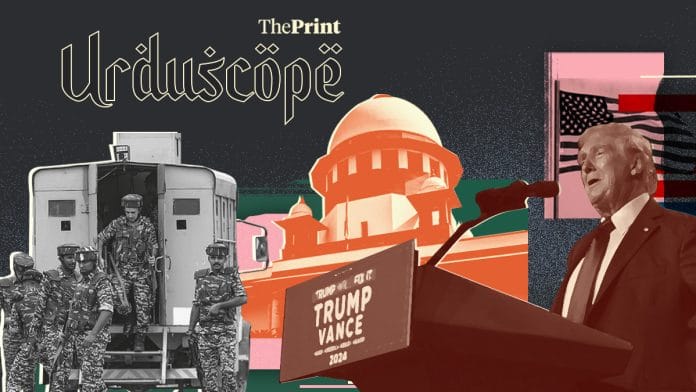New Delhi: Donald Trump’s victory in the US presidential elections was among the main topics covered by Urdu newspaper editorials this week. They discussed his promise to end wars and how Kamala Harris’s loss was a lost opportunity for the country.
In their editorials, Siasat, Inquilab, and Roznama Rashtriya Sahara also welcomed the Supreme Court’s decision to overturn a lower court ruling striking down the Uttar Pradesh Board of Madarsa Education Act, 2004.
They also expressed concern over the worsening law and order situation in Jammu and Kashmir, referring to the reports of increasing violence against both locals and migrant workers in the region.
Here’s a wrap of the news and editorials in the Urdu press last week.
Trump and ending wars
Siasat’s editorial, published on 7 November, highlighted President-elect Trump’s remarks in his victory speech about ending, not starting, wars, saying it was important in light of the global situation. While Trump didn’t specify what he was referring to, the newspaper inferred that he seemed to be talking about Ukraine, where his victory has implications for US support and aid.
His comments, the editorial said, also have implications for Israel’s campaign in Gaza, which has largely been backed by the Biden administration. Still, “when it comes to ending wars, it will be important to see what plans he has in mind,” Siasat said.
On the same day, Sahara said in its editorial that Donald Trump’s victory marks the beginning of a new political chapter globally. The newspaper said that the results of the elections will significantly influence the affairs in many countries.
At home, it said, his campaign slogan “Make America Great Again” embodies a shift away from diversity and towards the domination of the white Christian identity.
Inquilab’s editorial said Democratic candidate and Vice President Harris’s loss was a missed opportunity for the US to get its first female president.
It said, Trump’s refusal to accept the results of the 2020 election was a sign that he wasn’t ready for power and lacked the dignity to accept defeat with grace. His attacks on Harris, calling her “crazy” and “mentally disabled”, were unbecoming of a presidential candidate. However, the results show that the American people didn’t find his conduct particularly objectionable.
‘SC ruling should put an end to attacks on madrasas’
Siasat’s 6 November editorial welcomed the Supreme Court’s ruling allowing madrasas to continue their services, overturning an earlier judgment by the Allahabad High Court that declared the UP law as unconstitutional.
It said that ever since the BJP returned to power at the Centre and won in various states, especially Uttar Pradesh and Assam, Islamic madrasas have been under scrutiny with huge efforts to malign them.
This is part of ongoing hostility towards Muslims and ignores the crucial role that madrasas and their scholars played in India’s freedom struggle, it said. Even today, these institutions provide education, teach discipline, and, on the whole, shape young citizens—many of whom go on to serve the country in various fields.
It further said, “A law created by any government cannot be unconstitutional, as it goes through discussions in the assembly and cabinet before being passed. By trying to target religious madrasas, the BJP has once again proven that it is anti-Muslim and against minorities.”
On 6 November, Sahara said the Supreme Court’s decision is a milestone for Uttar Pradesh madrasas, granting the Act constitutional status and empowering state governments to reform religious institutions under a legal framework. This verdict offers hope for madrasa students and shows that educational reforms can be pursued within constitutional limits.
Separately, Inquilab’s editorial praised the Supreme Court for giving significant relief to UP madrasas and said that this decision should put an end to baseless accusations against them. The editorial also said that the madrasa system has been a long-established part of the country with its graduates being a valuable asset to the country.
It noted the inconsistencies between the Supreme Court and the Allahabad High Court’s rulings on the same law and its interpretations.
Inquilab also raised questions raises questions over legal interpretations. How can two decisions on the same law vary so widely, it asked. The issue deserves closer examination.
In such cases, the editorial added, the Supreme Court should take proactive steps to address such contradictions by seeking clarification from these courts.
‘J&K needs a comprehensive law and order plan’
On 4 November, Siasat said the increasing violence in Jammu and Kashmir, targeting both locals and migrant workers, contradicts the central government’s assertions that terrorism and violence had decreased in the region over the past decade.
There had been hope that the formation of a democratically elected government could improve the law and order situation but that does not seem to come to pass, it added.
The editorial said that it was time for the central and state governments to devise a comprehensive plan to restore law and order and create trust among people. If the violence continues, it will harm economic activities, especially tourism, which is vital for the region’s stability, it concluded.
(Edited by Sanya Mathur)
Also Read: Why is manufacturing at 8-month low despite Make in India, asks Urdu press






